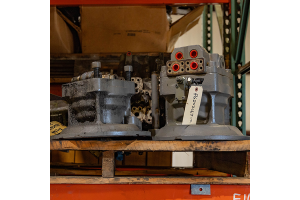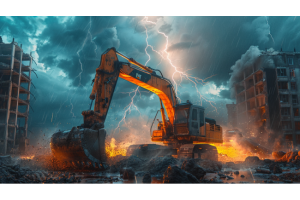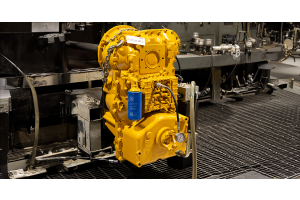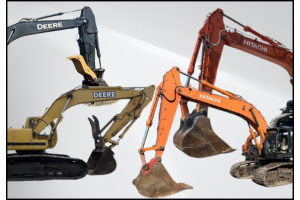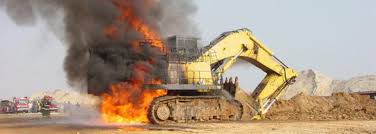
We get a lot of calls here at ConEquip from people needing new cabs because their machine was torched by a fire. Fire is a common problem with construction machines. Machines run hot, use a lot of fuel and other flammable material, and work in hazardous conditions. The biggest reason fires happen is when something on the machine has been neglected.
Every fire has two main components, what ignites the fire and what feeds the fire. Ignition can be a spark, fire, over extreme heat.
Here are some of the most common culprits when it comes to machine fires.
A turbocharger creates a lot of heat. Turbos get hot enough to start a fire with just about any type of fuel or debris. To prevent fires sparked by the turbo, keep the engine clean and make sure leaks are taken care of immediately.
Other sources of high heat that can start a fire are exhaust manifolds, locked up bearings, and breaks.
Electrical wiring is another main source of fires. Damaged wires or wiring that is installed improperly is often declared the reason for a machine fire by investigators. Inspect your wiring on a regular basis and replace wires when you notice they have been compromised. Also, clear all wiring away from unwanted exposure to the elements or friction.
Pay attention to your batteries. Too much current can cause battery insulation to burn. Charge and store your batteries according to codes and directions.
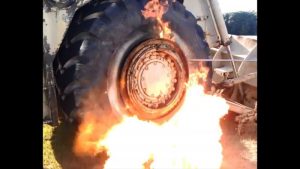
Tire fires are also another common problem. Poor tire maintenance can end up leaving small shard of metal inside a tire. When the tire heats up, those pieces of metal can cause the rubber to burn. When a tire catches fire it is usually game over. It's almost impossible to put a tire fire out. Instead, machine operators usually have to let the fire burn. When they're still on your machine, that usually means the backhoe, wheel loader, skid steer, etc. will be toast.
Be very careful when doing work that causes a lot of heat like welding. If you are near something flammable, sparks from the tool can start a small fire that can quickly get out of control. Often welding or grinding is done right on the machine. When fires ignite, if there isn't an extinguisher at the ready, there may no longer be a need to weld or grind that part!
Diesel fuel has an ignition source flash point of 126 and 205 degrees Fahrenheit. At 650 degrees diesel fuel will burst into flames without an ignition source. Sources include leaky injectors, fittings, and fuel lines.
Hydraulic fluid has an ignition source flash point of 400 degrees and an auto-ignition point of about 650 degrees. Sources are typically the same as diesel fuel including leaks.
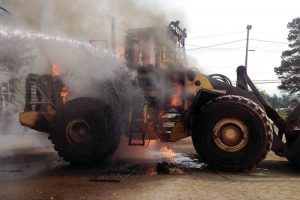
Debris is a common source of fires. When machines are used to clear land, demolish structures, and work in a landfill, it's impossible to keep flammable material from interacting with a hot machine. Everything from dry brush to plastic bags can come in contact with high heat areas. Operators need to keep vigil on potential fire hazards and keep their machine as clean as possible while in operation. Having someone on the ground with a water hose and the ability to keep vigil for unwanted debris can help prevent small fires from getting out of control or even starting in the first place.
Clean machines on a regular basis to reduce the chance debris will ignite a catastrophic fire on your machine.
Call 716-836-5069
We will scour the parts networks for you. Don't waste hours trying to find a part only to find that it doesn't fit or the supplier can't deliver. We know who to call for the fastest delivery at the right price!




